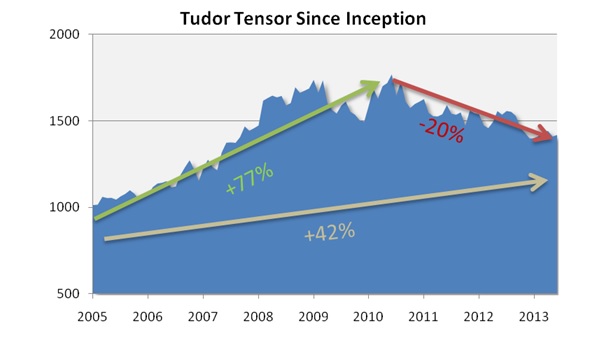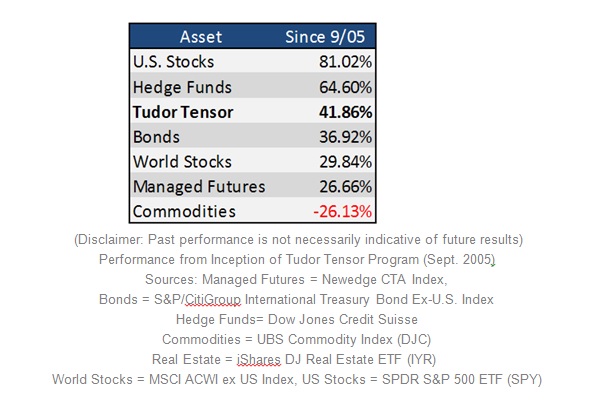The Twittersphere couldn’t get enough of the news last week that hedge fund legend Paul Tudor Jones was shutting down one of his eponymous funds, the Tudor Tensor Fund (try saying Tudor Tensor 10 times fast).
And critics of hedge funds will jump to the conclusion that it’s a dangerous world out there among alternative investments, and investors need to be careful because even a legend like Paul Tudor Jones can’t make money, having to shut down his futures fund. Some will throw around the term survivorship bias too, concluding that the indices composed of hedge fund returns won’t include this program moving forward as a way of saying the index over reports the performance of the asset class – never mind that the program is shutting down, that the Dow no longer includes buggy whip companies, either – or that the index still includes the past performance of the shuttered fund.
But just how bad was the Tensor performance that they decided to shut the fund down? What does a hedge fund ‘failure’ actually look like? The answer is, not that bad… Here’s a snapshot of just how the Tensor Fund has performed since inception, having returned a total of 42% over that time after running up 77%, then drawing down -20% over the last three years.

(Vami growth of 1,000; Disclaimer: Past performance is not necessarily indicative of future results)
The relative performance wasn’t all that bad either, with Tensor outpacing their benchmark (managed futures) as well as the markets they track (commodities) as well as a few little known asset classes called Bonds and World Stocks.

The real story here isn’t really how this program performed or that Paul Tudor Jones can’t cut it in managed futures, the real story is the business side of the hedge fund business. I have no doubt that Tudor and their team believe this program will perform over the long-term and that this point likely marks a low for the model. But big hedge funds like Tudor know how the asset-gathering game works.
The Tensor Fund went from over $1 billion ($1.5 per our numbers) down to just $120 million times over the last three years, and that is the reason the fund is closing, not anything to really do with performance, the skill of the manager, or expertise of the team. The closing of Tensor is more of a commentary on investors buying in at the top of a cycle and getting out at the bottom than anything else.
Here’s a picture of the Tensor equity curve with the assets raised – green money coming in, red money going out – overlaid (using a simple formula of growth in AUM less the performance multiplied by last month’s AUM to arrive at an estimate of how much of the growth in AUM was from performance verses from asset raising). You can see that the largest concentration of money came into the program (over 34% of all the money raised) just as it had made new equity highs and was poised to begin a (rather normal) draw-down period.
(Vami growth of 1,000; Disclaimer: Past performance is not necessarily indicative of future results)
The real story is that nearly $700 million came flying into the fund on 4 years of good performance and the Tudor name almost exactly at the wrong time. The real story is the same story we’ve heard a million time and see play out again and again with mutual fund flows and the rest – investor’s getting in at the top, and out at the bottom. This is nothing new to those in the investment industry – and goes to show that even a hedge fund ‘brand name’ like Tudor isn’t immune from performance chasing.
As for the business side of things – the bottom line for a multi-billion-dollar shop like Tudor is that a $100 million fund is simply not worth the time and effort to keep going, no matter how well they think it will perform moving forward. The playbook on the business side of hedge funds is to shut this one down, and move on to the next project.
Jeff Malec is CEO and founding partner of Attain Capital Management, LLC and is on the Board of Directors of the National Futures Association. Jeff writes daily on the Attain Managed Futures blog.
